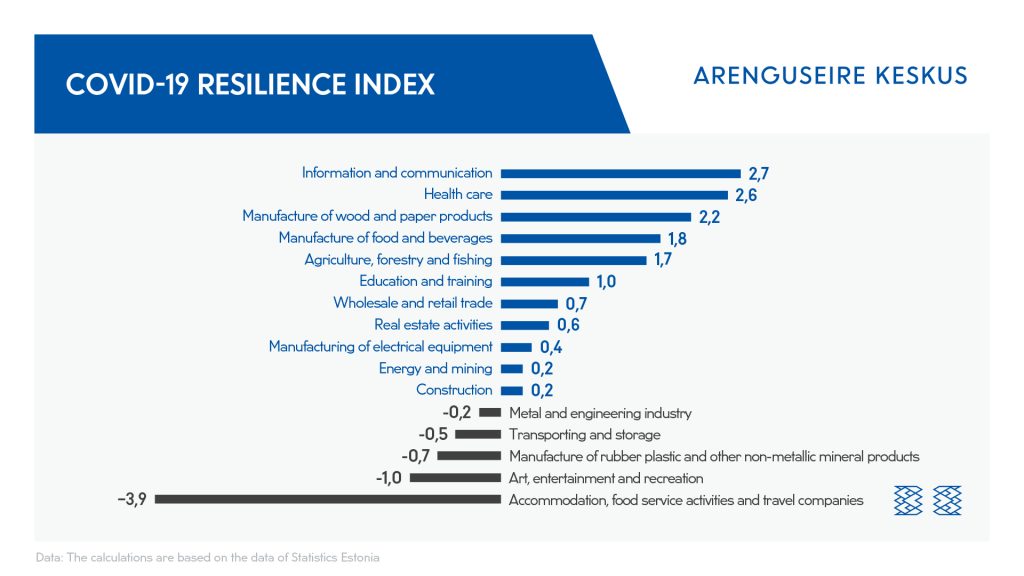Tourism will contribute less to the economy in the near future
Hospitality, catering and travel services were hit the hardest by the first wave of the coronavirus, shows the Foresight Centre report “The Impact of the Virus Crisis on the Estonian Economy. Scenarios up to 2030”, soon to be published. The monthly turnover of the whole sector dropped by 76.2% compared to earlier, while travel companies saw their turnover drop by 98.3%.

“As hospitality, catering and travel services are based on the free movement of people when countries went into lockdown in the spring, the sector lost almost all of its economic activities,” said Uku Varblane, expert of the Foresight Centre. “The hospitality and catering sector found some relief in domestic tourism, but the rising infection indicators mean that the sector is heading for a tough winter and spring.“
Varblane does not believe in a quick recovery of the international tourism sector in the near future, and Estonia’s hospitality and catering sector need to focus on domestic and near markets. “Whereas we used to see strategies being developed for bringing Asian tourists into Estonia, in the coming years the focus will probably be on tourists from neighbouring countries,” Varblane said. He added that it would be difficult to achieve the pre-crisis tourist figures any time soon because the Bank of Estonia figures showed 694,000 visits from abroad to Estonia in the 3rd quarter of this year, which is only one-third of the number last year.
In the upcoming years, the core issue of the sector will be client safety, which will shape demand in hospitality, catering and travel services. “In the near future, car or boat trips domestically or into neighbouring countries will probably win in popularity over air trips,” Varblane said. “There will most probably be an increasing demand for solutions that increase traveller safety. For example, location data of mobile phones could be used in airports to identify the traveller upon their arrival and direct them to the least crowded access points, while robots would take care of the baggage. The traveller should be given broader options, e.g. for easy change or cancelling of the trip. Solutions that offer options help to recreate the trust that is vital for stimulating the sector,” he added.
Hospitality, catering and travel services employed over 30,000 people in 2019; the revenue of the sector was EUR 1.15 billion, or 1.7% of the whole Estonian economy.
Due to the virus crisis, the monthly turnover of the hospitality industry decreased by up to 91.1% in comparison to the previous year but reached the level of –44.7% in comparison to the previous year in August. The largest decrease in turnover relating to the virus crisis in the catering industry was in April when the monthly turnover was 66.9% lower than in the previous year. Travel companies have had the most dismal time and even in August, the turnover remained over 88% less than last year.
According to the COVID-19 resilience index developed by the Foresight Centre, the hospitality, catering and travel industry ranks the last (-3.9 points) by resilience to the crisis among the 17 economic sectors.
COVID-19 resilience index
The COVID-19 resilience index measures the extent to which economic sectors are affected by the coronavirus crisis. The index is based on various economic indicators of companies. The value of the index is between -5 (the largest negative impact) and +5 (the smallest negative impact). The index takes into account the changes in the turnover of companies (total turnover in March–August 2020 compared with the same period the year before) in the economic sector, changes in their number of employees in comparison to 2019 and the dynamics after the emergency situation, changes in labour expenses, and changes in the profit and investments of companies in comparison to the same period last year.

BACKGROUND
- The Foresight Centre started publishing surveys of the impact of the virus crisis on economic sectors on 17 November. On 21 November, the Centre will publish a short summary of the food industry.
- The calculations and figures of the surveys use the data of Statistics Estonia. The descriptions of development perspectives are based on interviews with representatives of sectoral associations and the focus group interviews conducted in cooperation with the research group of the Estonian Qualifications Authority OSKA. The Foresight Centre will present the scenarios for exiting the virus crisis at the beginning of December. Read more: https://arenguseire.ee/en/uurimissuunad/impact-of-covid-19/.
- The impact of COVID-19 on the changes in the employment and skills in hospitality, catering and travel industry is described in OSKA’s special survey, which will be published in early 2021.
The Foresight Centre is a think tank at the Chancellery of the Riigikogu that analyses long-term developments in society and economy. The Centre conducts research projects to analyse the long-term developments in Estonian society and to identify new trends and development directions.
Latest news
-
27.06 2025Current low birth rate will lead to up to 1.3 billion euros less tax revenue in the future
In its new short report “The impact of population ageing and low birth rate on long-term state revenue and expenditure”, the Foresight Centre notes that the lower than projected birth rate will reduce government spending on family policy and education, but in the long term, it will mean up to 1.3 billion euros less in tax revenue.

 An independent think tank at the Riigikogu
An independent think tank at the Riigikogu 